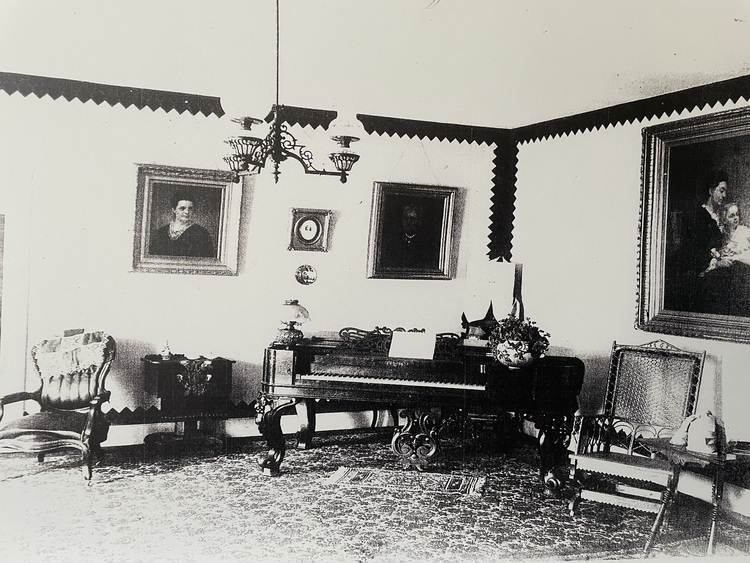
Parlor
This parlor was the heart of the home for 150 years. Guests would have entered into a hallway that connected the front and back doors – you can still see the remnant of the dividing wall! Visitors would have walked through a large archway into this welcoming space. Renovations to the house in later years cut down the space of this room to accommodate the addition of a modern bathroom, but it’s still is an impressive room! Parlors were where families entertained guests and displayed their status. Thomas and Charity Rotch welcomed many important visitors here from Kendal and the next family to live at Spring Hill did the same.
Since the Rotches had no children or heirs who wanted to take on the property at the time of their passing, Arvine Wales purchased Spring Hill. You can see his portrait to the right of the standing mirror. Originally from Vermont, he was employed by the Rotches while they were still living in New England. After shepherding those Merino sheep to Ohio, Arvine made a name for himself as an honest worker, a friend to all, and a man of firm convictions. During the War of 1812, he risked his life to warn a Native American tribe of approaching soldiers, saving them from massacre. In gratitude, they gifted him with a very rare honor – a hand-carved ladle with their totem. Through his sympathies with the abolitionist movement, nurtured by his Quaker associations, Arvine Wales continued to keep Spring Hill open as a station on the Underground Railroad. He also worked hard to help establish the Charity School of Kendal, sitting on its Board for the rest of his life.
Arvine married again in 1825, this time to widow Ann Foote Baldwin. Ann and her ten-year-old son, Pomroy, moved into Spring Hill and shortly after Ann gave birth to a son, Arvine Chaffee Wales. We’ll call him “A.C.” – as there are a few “Arvine’s” in our story.
In 1828, a malaria epidemic struck the area and the decease would claim Ann’s life. Pomroy moved back east to live with his mother’s family. In 1833, Arvine married his third wife, another widow, Nancy Shepherdson. Her portrait is above the writing desk. She had two daughters from her first marriage, Lydia and Louise who both ended up living in Massillon. Nancy and Arvine were well-known for their hospitality and social gatherings. The parlor and the formal dining room would have been a hub of activity during the late 1830s through the 1850s.
A.C. was a bright young man, and Nancy and Arvine both encouraged his schooling. However, it was Nancy who nurtured A.C.’s desire to go to college. A.C. received his higher education at Woodward College of Cincinnati, then read law and was admitted to the Cleveland bar in 1848. He graduated Harvard Law School in 1849, and immediately began a successful practice of law in Canton.
In January of 1854, Arvine Wales passed away, and his wife Nancy did the same only a few short months later. At their deaths, A.C. inherited the farm and moved back into Spring Hill. He continued farming as his father had done, and lived in Spring Hill with his half-sister Lydia as his hostess for almost ten years. A.C. was thought to be a confirmed bachelor until he met Eliza Weimer Robinson. He was entirely smitten with her. Eliza was a young widow and was slow to accept A.C.’s proposal, which he pursued relentlessly. She finally said yes, and they eventually married on December 28, 1864. They honeymooned in Washington, D.C. where they were invited to a reception hosted by President Abraham Lincoln and Mrs. Mary Todd Lincoln. Both A.C. and Eliza were supporters of the abolitionist movement, an end to the war, and the promise of Emancipation.
They returned home to Spring Hill and quickly became quite the power couple. Eliza was an excellent match for A.C. Her strong affection for her home, for Massillon and her friends, mixed with her good nature and hospitable attitude were among her many endearing characteristics. Her interests varied from horticulture, to opera, to civil rights! She had a keen mind for management and was directly involved with the affairs of Spring Hill farm as well as the Massillon community. In 1870, when A.C. was elected to the Ohio Senate. prominent guests from around the state would have been entertained in this space, such as William McKinley, who, at the time, was Prosecuting Attorney of Stark County.
A.C. and Eliza had three children: Helen, Arvine III, and Horatio. We can discuss more about them when you’re ready to move on to the Library. You can view photographs and portraits of A.C. and Eliza Wales, as well as their impressive Chickering piano and the knick-knacks collected over the years.